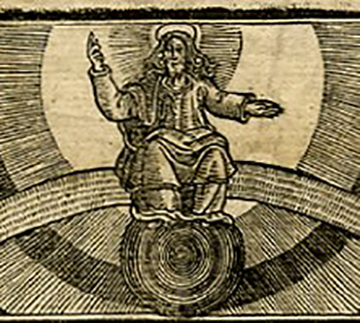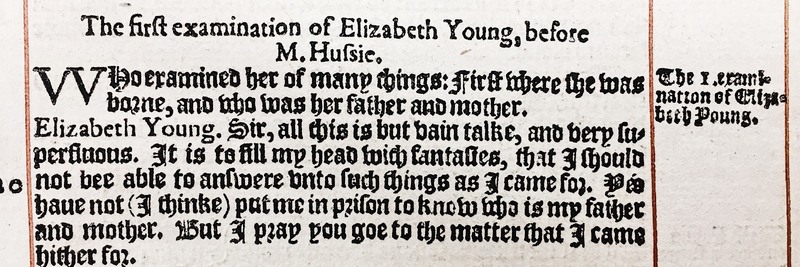Playing Dumb
Young’s intelligence is evident in the text. However, at several points over the course of her examinations, Young suddenly switches to a tone of ignorance and innocence. Young repeatedly states, “I understand it not,” referring to Mass spoken in Latin, the teachings of her interrogators, as well as book oaths. This statement is partly due to her protestant beliefs, and the purpose of the text; as Monta explains, "many of Foxe’s female martyrs emphasize their unlearnedness and/or their simplicity," and "the readers whom the text works so hard to usher into its Protestant community are to conclude that only God could inspire such constancy and zeal in otherwise unremarkable people” (5). Given the protestant emphasis on individual learning, it is crucial for Young “that she understand her beliefs. She becomes angry when material is read in Latin during her examinations” (Levin 214). She states that she will not go to Mass “til I may heare it in a tongue I can understand” (Foxe 1876). In light of this, Young’s simplicity could be considered a stand against papist customs.
Young’s ignorance, however, is also a good way to avoid questions. As Geng explains, “[i]n Tudor trials, silence was equated with guilt and malice,” and thus “defendants had little choice but to verbally engage with their interrogators” (668). Stating that she does not understand, thus provides Young with a way to resist her interrogator’s questions about where her texts came from and who translated them. In an exchange during her third examination, Young utilizes this strategy to taunt Doctor Martin when he asks, “how manie Gentlement were beyond the Seas,” referring to Emden, where Young brought the books from. In the following interaction, Young's feigned ignorance is evident:
To his initial question, Young replies, “It is too much for me to tell you how manie are on the other side. (Foxe 1874). Young’s ingenious answer implies feminine frailty and ignorance. Martin shakes his head and continues, “No, I meane but in Frankford and Emden, where thou hast beene,” to which Young answers, “Sir, I never did take account of them: it is a thing I looke not for” (1874). Here, once again, Young purposefully misunderstands the question, and implies a virtue so strong that she does not even pay attention to men. She is gleefully toying with Doctor Martin; this exchange is not only humourous, but also displays Young’s ability to confuse and evade her examiners.
Another instance of this adopted simplicity can be seen in her first examination, when Master Hussie asks who her parents are. She says: “Sir, all this is but vain talke, and very superfluous. It is to fill my head with fantasies, that I should not bee able to answere unto such things as I came for” (Foxe 1873). This statement provides an interesting contrast; while Young implies that her frivolous mind will not be able to focus if too many new ideas are introduced, she ends the sentence in a place of power. Crucially, “such things as I came for,” implies a plan and a purpose; it is as if she was the one who sought out her examiners, rather than being apprehended and interrogated. She continues, "I pray you goe to the matter that I came hither for" once more, implying that she is in control of the situation (1873). Her words are still cloaked in simplicity; however, she subtly asserts authority.
Although her male examiners try over and over again to educate her, Young resists their attempts. In the first examination, when Young declares that she does not know what a book oath is, Master Hussie attempts to explain (Foxe 1873). However, Young cuts him off, immediately asserting, “Sir, I doe not understand it, and therefore I will not learne it” (Foxe 1873). This statement is a paradox that Young purposefully employs. If she did not understand, it would follow that she would learn; however, she does not understand it and refuses to learn. Even Hussie grasps this, exclaiming, “thou wilt not understand it” before storming out of the room (1873). In her fifth examination, Young quotes a long passage of scripture, and then asks the Chancellor, "I pray you sir, what meaneth Christ by that?" (Foxe 1875). Here, although the Chancellor rolls his eyes and says, "O God forbid. Would yee have mee to interpret the scriptures?" Young is not asking genuinely (1875). As already established, Young refuses to be taught. Rather, she is bringing the scripture to the Chancellor's attention, and asking him to interpret it himself, in line with the Protestant emphasis on a personal understanding of the bible. Later on in the fifth examination, the chancellor begins to catch on, and says: "So mee thinketh: Thou wilt take upon to teach me," to which Young replies simply, "No sir, but I let you know what I know: and by argument one shall knowe more" (1875.)


